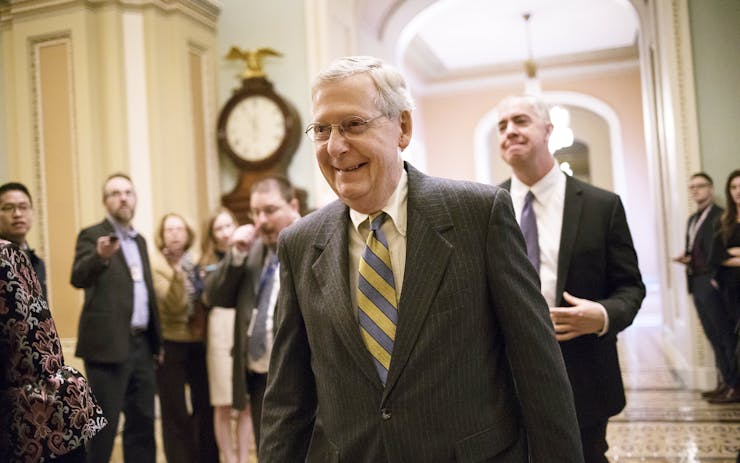At midnight Friday, the federal government shut down.
What does that mean for medical marijuana? It’s not good.
Rohrabacher-Blumenauer protections are no longer in effect. But they will likely return.
The Rohrabacher-Blumenauer amendment, which has protected medical cannabis patients and caregivers from federal interference since 2014, was part of the budget appropriations bill. So when the budget expired, so did those protections.
The protections are no longer operative—but that doesn’t mean federal officials are going to start arresting MMJ patients tomorrow.
With the federal government shut down, all non-essential government personnel are furloughed. Even if a federal prosecutor wanted to go after a medical marijuana target, they wouldn’t have the law enforcement personnel on hand to carry out the arrests.
Mind the Gap
In addition, the protections in the Rohrabacher-Blumenauer amendment affect any cases that might be brought during this gap in coverage. In other words, if the next budget that Congress adopts includes the amendment, then federal authorities could not pursue any case that was brought during the lapse in coverage.
Rep. Earl Blumenauer (D-OR) reiterated on Thursday that he will continue working to maintain the provision in whatever funding bill Congress passes next.
Here’s the ‘Good Shutdown’
Even though President Trump said he wanted to avoid a shutdown, the uncertainty he caused through Thursday intensified on Friday. Trump has supported a government shutdown in the past, writing in a tweet last May when the government was in the same position: “Our country needs a good shutdown in September to fix mess!”
This time, Trump’s flip-flopping on Deferred Action for Childhood Arrivals (DACA), the so-called “Dreamers” immigration policy act, and the Children’s Health Insurance Program (CHIP), providing low-cost health coverage to children in families that earn too much money for Medicaid, accelerated the uncertainty in budget negotiations through the week, resulting in the shutdown on Friday.
Meanwhile, a Flurry of Cannabis Bills
The only upside to the chaos of the shutdown has been the quiet work on marijuana legalization that was happening at the same time on the Hill, much of it since the middle of January.
A new House bill introduced on January 17, sponsored by Rep. Barbara Lee (D-CA) and Rep. Ro Khanna (D-CA) and about a dozen co-sponsors, is a companion bill to Sen. Cory Booker’s “Marijuana Justice Act”, S. 1689 that was introduced in August, 2017, and has languished in the Senate Judiciary Committee.
NORML reports that this is the first time that companion legislation has been introduced in both chambers of Congress to remove marijuana from the Controlled Substances Act (CSA).
On January 18th, Lee tweeted that her justice act bill “is a landmark bill to help us end the destructive, discriminatory #WarOnDrugs and rebuild the lives torn apart by these failed policies.”
Barbara Lee: The New Cannabis Champion
Congresswoman Lee is also the sponsor of “States’ Medical Marijuana Property Rights Protection Act” (HR 331), with Blumenauer as one of the six co-sponsors; a co-sponsor, along with both Rohrabacher and Blumenauer, of Colorado Rep. Jared Polis’ bill “Regulate Marijuana Like Alcohol Act” (HR 1841), that saw a surge of six new co-sponsors since the beginning of the year for a total of 23; a co-sponsor of Blumenauer’s bill “Marijuana Revenue and Regulation Act” (HR 1823); and one of 66 co-sponsors (eight just since January 16) along with both Blumenauer and Rohrabacher, of “Safe and Fair Enforcement Banking Act (SAFE) of 2017” (HR 2215).
She is also a member of the Appropriations and Budget Committees, and is seen as a strong ally in Congress in any discussion of the continuation of the Rohrabacher-Blumenauer amendment.
Old Bills See New Life
Even older marijuana-related bills have been getting traction in January while Congress focused on the budget.
Both Blumenauer and Rohrabacher are co-sponsors of Rep. Tom Garrett’s (R-VA) bill “Ending Federal Marijuana Prohibition Act of 2017” (HR 1227), introduced February 27, 2017, now with 25 co-sponsors – 10 since the beginning of 2018.
Also in February, 2017, Rohrabacher introduced the “Respect State Marijuana Laws Act of 2017” (HR 975), now with 40 co-sponsors including both Blumenauer and Lee – 16 since the beginning of the year.
Now that work will potentially have to face renewed scrutiny because of the shutdown and the elimination of the amendment.





